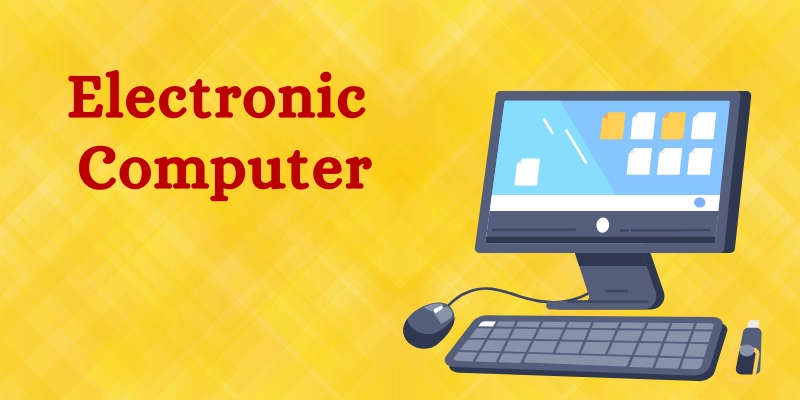Electronic Computer – Definition Feature and Uses
Published: 3 Sep 2025
Have you ever used a computer to watch videos, type a message, or play a game? If yes, then you’ve used an electronic computer. These machines help us do many things quickly and easily. From schools to offices, they are used everywhere.
An electronic computer works with electricity and follows instructions to solve problems, store data, and perform tasks. Learning how it works can help us use it better in daily life.
In this guide, we’ll learn about the electronic computer.
What is an Electronic Computer?
An electronic computer is a machine that uses electricity to follow instructions, solve problems, store data, and do many tasks quickly.

It helps us in schools, offices, and at home for learning, work, and fun.
- Works using electricity
- Follows instructions to perform tasks
- Stores and processes data
- Helps with typing, drawing, and watching videos
- Used in education, business, and daily life
History of Electronic Computers
The history of electronic computers began many years ago. At first, people used fingers and stones to count. Later, they built machines to solve big problems. Over time, these machines improved and became the computers we use today.
- The first electronic computer was called ENIAC.
- It was made in 1946 in the USA.
- ENIAC was very big, almost the size of a whole room.
- It could only do simple math.
- With time, computers became smaller, faster, and smarter.
- In the 1970s and 1980s, personal computers (PCs) were made for home and office use.
- Later, laptops and mobile devices were also invented.
- Today, computers are used everywhere, in schools, homes, shops, hospitals, and even in smartphones.
Main Features of an Electronic Computer
Electronic computers are smart machines that can do many tasks quickly and correctly. They are used in almost every part of life because of their useful features.
Here are some key features of an electronic computer.
- Speed: Computers can work very fast and do big tasks in seconds.
- Accuracy: They give correct results if the input is correct.
- Storage: Computers can store a large amount of data and files.
- Automation: Once given a task, they can work on their own without stopping.
- Multitasking: Computers can do many things at the same time.
- Communication: They help us send messages, emails, and talk online.
- Tiredness: Unlike humans, computers do not get tired or bored.
How Does an Electronic Computer Work?
An electronic computer works by taking input, processing it, and giving output. It follows step-by-step actions to solve problems or complete tasks. These steps happen very fast with the help of different computer parts.
Here are some basic steps of how a computer works.
- Input: The computer gets data or commands from input devices like a keyboard or mouse.
- Processing: The CPU (central processing unit) works on the data and makes decisions.
- Storage: The computer stores information either for a short time (RAM) or a long time (hard drive).
- Output: The result is shown using output devices like a monitor, printer, or speakers.
Basic Parts of an Electronic Computer
An electronic computer is made up of different parts that work together. Each part has its own job to help the computer work properly. Here are the main parts:
- Input Devices: These help us give data or commands to the computer. Example: keyboard, mouse.
- CPU (Processor): This is the brain of the computer. It processes all the data and controls the work.
- Memory (RAM, Storage): RAM helps the computer work faster. Storage (like hard drives) saves files and data.
- Output Devices: These show us the result of the computer’s work. Example: monitor, printer.
Types of Electronic Computers
There are different types of electronic computers used for different needs. Some are small and used at home, while others are very big and used by large companies or scientists.
- Microcomputer (PC): A small computer used in homes, schools, and offices. It is also called a personal computer.
- Laptop: A portable computer that you can carry and use anywhere. It runs on a battery.
- Tablet: A small, touchscreen computer, easy to carry and use with fingers.
- Supercomputer: A very powerful computer used for big tasks like weather studies or space research.
- Mainframe: A large computer used by banks, airlines, and big companies to handle lots of data.
Common Uses of Electronic Computers
Electronic computers are used in many areas of daily life. They help people work faster, learn better, and stay connected. Here are some common uses:
- Education: Students use computers to study, watch videos, and do homework.
- Office Work: People use computers to type letters, send emails, and make reports.
- Communication: Computers help us send messages, make video calls, and use social media.
- Shopping: We can buy or sell things online using computers.
- Entertainment: People watch movies, listen to music, and play games.
- Banking: Computers are used for online banking, checking accounts, and paying bills.
- Healthcare: Doctors use computers to check records, write reports, and look at test results.
- Travel: Computers help book tickets, check flight details, and find directions.
Advantages of Using Electronic Computers
Electronic computers help us in many ways. They make our work faster, easier, and more accurate. Below are some of the main benefits:
- Work: Computers can do tasks in seconds that take people hours.
- Accuracy: They give correct results if the data is entered properly.
- Storage: Computers can store a lot of information, like files, photos, and videos.
- Multitasking: A computer can do many jobs at the same time, like typing and playing music.
- Time and Effort: Computers do the hard work, so we can finish faster and with less effort.
- Communication: We can chat, email, or video call anyone around the world.
- Learning: Computers make learning fun through videos, games, and online classes.
Limitations of Electronic Computers
Even though computers are very useful, they also have some limits. They cannot do everything and sometimes need human help.
- Power: Computers cannot think or make decisions on their own.
- Electricity: Most computers cannot work without power or a battery.
- Mistakes: If we give the wrong data, the computer gives the wrong results.
- Feelings: Computers cannot feel emotions or understand human needs.
- Expensive: Some computers and parts can be costly to buy or repair.
- Hacking: Computers connected to the internet can be hacked or misused.
- Training: Some people need to learn how to use a computer properly.
Importance of Electronic Computers in Daily Life
Electronic computers play a big role in our everyday lives. They help us learn, work, talk to others, and have fun. Today, almost every person uses a computer in some way, at home, at school, or at the office.
Here are some points that are important in daily life.
- Education: Students use computers to study, watch lessons, and do homework.
- Work: Offices use computers to write reports, send emails, and save data.
- Communication: Computers help people chat, email, and video call anywhere in the world.
- Services: We use computers to shop, pay bills, and book tickets.
- Support: Doctors use computers to check reports, book appointments, and give treatment.
- Entertainment: People watch movies, listen to music, and play games on computers.
- Time: Computers finish work faster than humans, saving time and effort.
Future of Electronic Computers
The future of electronic computers looks very exciting. As technology keeps growing, computers are becoming smarter, smaller, and more powerful. In the coming years, they will help us even more in daily life, work, and science.
We Can Expect in the Future.
- Computers: Computers will work even faster and save more time.
- Machines: With AI (artificial intelligence), computers will learn and think better.
- Weight: Future computers may be tiny and easy to carry anywhere.
- Healthcare: Computers will help doctors find and treat diseases more quickly.
- Learning: Students will use computers more for smart and fun learning.
- System: Computers will control lights, doors, traffic, and more automatically.
- Technology: Future computers may have stronger security to stop hacking.
Conclusion
In this guide, we’ve learned about electronic computers. Electronic computers have changed the way we work, learn, and live. They use electricity to process data quickly and give fast results.
People use them for writing, studying, designing, and even playing games. These computers help us solve problems and save time. Knowing how they work helps us use them better in everyday life.
Now that you’ve learned about electronic computers, stay curious and keep exploring the world of technology!
Have a question or tip to share? Drop it in the comment box below!
FAQs
Got questions about electronic computers? Check out these FAQs for quick and simple answers.
Early computers were very big, slow, and hard to use. Modern electronic computers are small, fast, and easy for everyone. They also store more data and use less electricity than older ones.
A computer takes data through input devices. It then processes the data using the CPU. After that, it shows the result through output devices like a screen or printer. The processed data can also be saved for later use.
Electronic computers are used by many people in daily life. Students, teachers, doctors, office workers, shopkeepers, and even children use them. They help in learning, working, talking, shopping, and having fun.
Electronic computers are used in many places around us. They are used in homes, schools, offices, banks, hospitals, shops, and airports. These computers help people work faster and make daily tasks easier.
Yes, electronic computers need electricity to work. Without power, they cannot turn on or do any tasks. Some devices, like laptops or tablets, can run on a battery for some time. But even batteries need to be charged using electricity.
Yes, you can use an electronic computer without the internet. You can type documents, play offline games, watch saved videos, or use installed software. The internet is only needed for online activities like browsing or chatting. So, many tasks can still be done offline.
Yes, mobile phones are also electronic computers. They can process data, store information, and run many apps just like a computer. Smartphones even have input and output devices like touchscreens and speakers. That’s why they are called mini-computers.
Electronic computers are very important in today’s world. They help people work faster, learn better, and stay connected. Computers are used in almost every place, like schools, offices, and hospitals. They save time, improve accuracy, and make life easier.
Software is the set of programs that tell an electronic computer what to do. It helps the computer run tasks like typing, drawing, or playing games. Without software, the computer cannot work properly. There are two main types: system software and application software.
Electronic computers help students and teachers in many ways. They are used to watch lessons, do homework, and find information online. Computers also make learning fun through videos, games, and quizzes. They are now an important part of schools and online classes.

- Be Respectful
- Stay Relevant
- Stay Positive
- True Feedback
- Encourage Discussion
- Avoid Spamming
- No Fake News
- Don't Copy-Paste
- No Personal Attacks

- Be Respectful
- Stay Relevant
- Stay Positive
- True Feedback
- Encourage Discussion
- Avoid Spamming
- No Fake News
- Don't Copy-Paste
- No Personal Attacks





